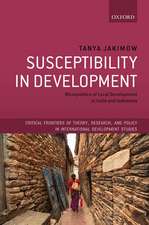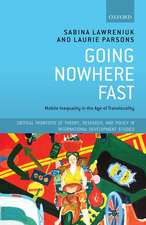Social Dictatorships: The Political Economy of the Welfare State in the Middle East and North Africa
Autor Ferdinand Eiblen Limba Engleză Hardback – 27 feb 2020
Preț: 566.63 lei
Preț vechi: 683.40 lei
-17% Nou
Puncte Express: 850
Preț estimativ în valută:
108.46€ • 117.85$ • 91.16£
108.46€ • 117.85$ • 91.16£
Carte tipărită la comandă
Livrare economică 09-15 aprilie
Preluare comenzi: 021 569.72.76
Specificații
ISBN-13: 9780198834274
ISBN-10: 0198834276
Pagini: 380
Dimensiuni: 160 x 240 x 25 mm
Greutate: 0.7 kg
Editura: OUP OXFORD
Colecția OUP Oxford
Locul publicării:Oxford, United Kingdom
ISBN-10: 0198834276
Pagini: 380
Dimensiuni: 160 x 240 x 25 mm
Greutate: 0.7 kg
Editura: OUP OXFORD
Colecția OUP Oxford
Locul publicării:Oxford, United Kingdom
Recenzii
This will be required reading for many graduate students of political economy.
Ultimately, Ferdinand Eibl's Social Dictatoships is a text that expresses with great clarity the theory of which it is the bearer; it is recommended for specialists interested in the debate on the evolution of social policies in the Middle East and North Africa and in comparative analysis, who will certainly appreciate, despite the schematic nature of the book, the author's subtle use of different methodologies, as well as the attentive archival research and interviewing upon which it is based.
Why do authoritarian regimes provide strikingly different levels of social welfare provision to their citizens and why does such variation persist over time? Focusing on the Middle Easts populous authoritarian regimes, this book offers a seminal take on this puzzle and offers an argument that is both theoretically rigorous and empirically rich. In doing so, the books relevance goes far beyond its stipulated focus on social welfare and the Middle East, and sheds new light on the everyday politics of authoritarian rule. This study offers the very best of political science and Middle Eastern studies and will serve as the gold standard against which future work on the subject will be judged.
In Social Dictatorships, Ferdinand Eibl makes a valuable contribution to studies of welfare regimes in developing countries and autocracies. Eibls logically rigorous explanation articulates the conditions under which authoritarian rulers develop broad support coalitions, which in turn incentivizes them to expand public services. A sophisticated combination of original quantitative and qualitative data and analyses provides ample evidence to support his nuanced arguments. As Eibl so convincingly shows, social dictators are not more benign and generous than their less generous counterparts, but their populations benefit from greater investment in social sectors.
Social Dictatorships is remarkable for both its theoretical synthesis and its empirical sweep. Ambitiously drawing together insights from across the rational-choice and historical-institutionalist traditions, Ferdinand Eibl carefully develops and compellingly delivers the bold argument that welfare states in labor-abundant Middle Eastern dictatorships have only substantially expanded when conflicts among elites could neither be reconciled nor repressed. A monumental contribution to our knowledge of Middle Eastern political economy and the historical development of authoritarian welfare states.
When scholars mix qualitative and quantitative methods, one of them usually gets short-changed. Ferdinand Eibl's book is a rare exception to this rule: his field research is of as high quality as his quantitative analysis. He has undertaken remarkable detective work through interviews with decision-makers and access to (now closed off) national archives, getting as close to elite decision-making as is humanly possible in authoritarian systems. At the same time, he has collected unique primary data to identify the long-term distributional consequences of these decisions across the MENA region. His findings are of great relevance for scholars of both authoritarianism and social policy.
Ultimately, Ferdinand Eibl's Social Dictatoships is a text that expresses with great clarity the theory of which it is the bearer; it is recommended for specialists interested in the debate on the evolution of social policies in the Middle East and North Africa and in comparative analysis, who will certainly appreciate, despite the schematic nature of the book, the author's subtle use of different methodologies, as well as the attentive archival research and interviewing upon which it is based.
Why do authoritarian regimes provide strikingly different levels of social welfare provision to their citizens and why does such variation persist over time? Focusing on the Middle Easts populous authoritarian regimes, this book offers a seminal take on this puzzle and offers an argument that is both theoretically rigorous and empirically rich. In doing so, the books relevance goes far beyond its stipulated focus on social welfare and the Middle East, and sheds new light on the everyday politics of authoritarian rule. This study offers the very best of political science and Middle Eastern studies and will serve as the gold standard against which future work on the subject will be judged.
In Social Dictatorships, Ferdinand Eibl makes a valuable contribution to studies of welfare regimes in developing countries and autocracies. Eibls logically rigorous explanation articulates the conditions under which authoritarian rulers develop broad support coalitions, which in turn incentivizes them to expand public services. A sophisticated combination of original quantitative and qualitative data and analyses provides ample evidence to support his nuanced arguments. As Eibl so convincingly shows, social dictators are not more benign and generous than their less generous counterparts, but their populations benefit from greater investment in social sectors.
Social Dictatorships is remarkable for both its theoretical synthesis and its empirical sweep. Ambitiously drawing together insights from across the rational-choice and historical-institutionalist traditions, Ferdinand Eibl carefully develops and compellingly delivers the bold argument that welfare states in labor-abundant Middle Eastern dictatorships have only substantially expanded when conflicts among elites could neither be reconciled nor repressed. A monumental contribution to our knowledge of Middle Eastern political economy and the historical development of authoritarian welfare states.
When scholars mix qualitative and quantitative methods, one of them usually gets short-changed. Ferdinand Eibl's book is a rare exception to this rule: his field research is of as high quality as his quantitative analysis. He has undertaken remarkable detective work through interviews with decision-makers and access to (now closed off) national archives, getting as close to elite decision-making as is humanly possible in authoritarian systems. At the same time, he has collected unique primary data to identify the long-term distributional consequences of these decisions across the MENA region. His findings are of great relevance for scholars of both authoritarianism and social policy.
Notă biografică
Ferdinand Eibl is a Lecturer in Political Economy at King's College London. He was previously a Postdoctoral Research Officer at the London School of Economics, and his research focuses on the political economy of authoritatian rule in the Middle East and North Africa, in particular in the areas of distributive politics, cronyism, and the political economy of coup-proofing.









